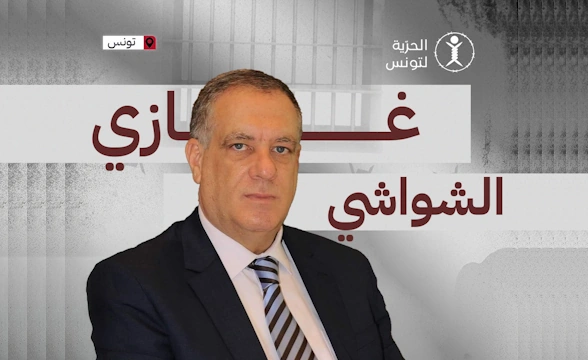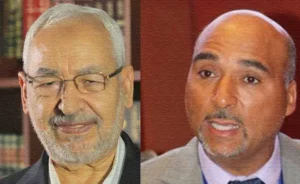July 17, 2025 – Status update – Political prisoner Ghazi Chaouachi suddenly underwent urgent stomach surgery at Bougatfa Hospital in Bizerte, without any prior knowledge of his family or lawyer. His family learned of the operation by chance, following a post by his son, Elyes, in which he noted that his father “underwent surgery while handcuffed and under tight security.” Tunisian authorities have not issued any official statement clarifying the circumstances of the case or the reasons for the family’s absence, which has exacerbated the anxiety of his family and supporters.
According to testimony from the defense team, Chaouachi had complained of severe stomach pain in the previous days and requested a medical examination in prison. After diagnosing his condition, doctors decided to urgently perform the surgery under general anesthesia. Sources close to the family reported that Chaouachi signed a consent document after being informed of the potential risks, including complications that could lead to death, but this was done without any prior notice to his family or lawyer. He spent the night in the hospital, shackled and under heavy guard, before being returned to Nadhour Prison after his condition gradually improved.
Multiple Violations of International Law and Treaties:
The Freedom for Tunisia Observatory considers that keeping Ghazi Chaouachi’s family and lawyers uninformed of developments in his health condition and subjecting him to an emergency medical procedure without informing them constitutes a grave violation of prisoner rights. Article 14 of Law No. 52 of 2001 on the Prison System requires that families be informed of a prisoner’s transfer. However, there have been repeated instances in recent months of sudden transfers of political prisoners, including Chaouachi’s transfer from Mornaguia Prison to Nadhour Prison, without notice or clear justification.
Article 14 – The prison administration must inform a prisoner’s ascendants, descendants, siblings, or spouse, of their choice, immediately upon admission and whenever they are transferred from one prison to another. Each prisoner must also provide, upon admission to prison, the name and address of a contact person in the event of an emergency.
Internationally, the United Nations Standard Minimum Rules for the Treatment of Prisoners (the Nelson Mandela Rules) affirm a prisoner’s right to be informed immediately of any serious health developments or of their transfer. These rules also guarantee their right to receive healthcare comparable to that available in the outside community, without discrimination. In Chaouachi’s case, despite receiving treatment, his shackles to his hospital bed and his exclusion from contact with his family constitute a flagrant violation of these standards.
The Observatory emphasizes that depriving a prisoner’s family of information about his health condition not only constitutes a source of psychological suffering but also amounts to cruel or degrading treatment, especially if carried out intentionally. This is prohibited by the International Convention against Torture and the International Covenant on Civil and Political Rights, which guarantee humane treatment for all persons deprived of their liberty.
What happened to Ghazi Chaouachi is not an isolated incident, but rather part of a systematic pattern adopted by the Tunisian authorities since July 25, 2021, to target political opponents. The Observatory has documented violations including the arbitrary transfer of prisoners, their detention in difficult conditions, and the denial of contact with their families, including medical intervention without guarantees of dignity or the right to information. These practices aim to break the morale of political prisoners and terrorize their families, a serious deviation from Tunisia’s human rights commitments.





